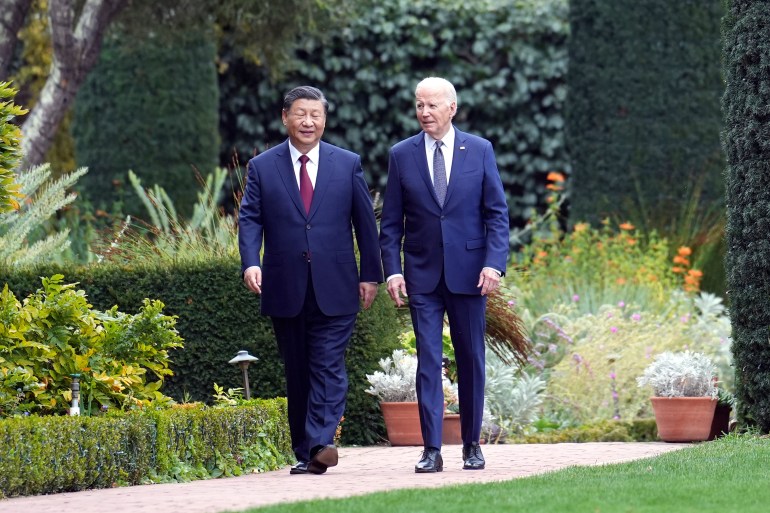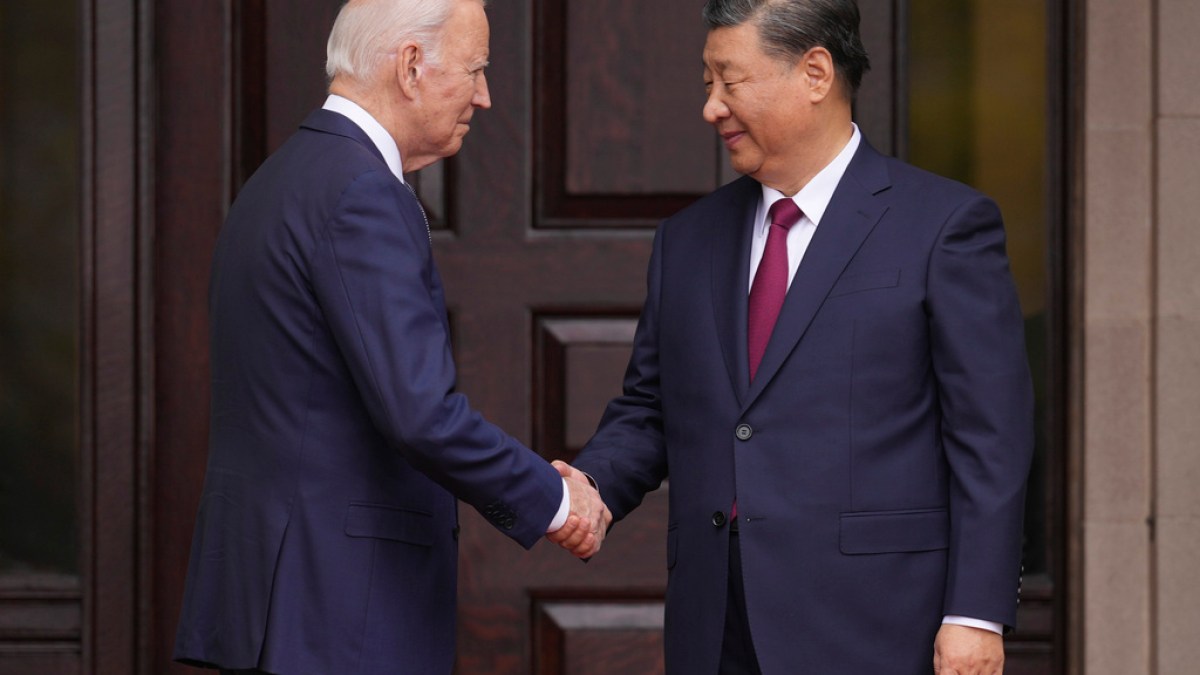For years, Chinese media has portrayed the United States as an unfriendly nation that seeks to contain and weaken China on the world stage.
The US has repeatedly been cast as a threat to world peace in Chinese media owing to Washington’s policies of arming Taiwan, sending military assistance to Ukraine, and supporting Israel’s war on Gaza.
So when stories in Chinese media suddenly began to appear about “strengthening China-US ties” and “the bonds of friendship between Americans and Chinese”, it naturally did not go unnoticed.
In the weeks before the long-awaited November 15 meeting between US President Joe Biden and Chinese President Xi Jinping at the APEC summit in San Francisco, China’s media softened its strident rhetoric.
State-run Xinhua news agency reported on a letter Xi sent to an American war veteran, who had served in the US Air Force group nicknamed the Flying Tigers and who fought with the Chinese military against the Japanese during World War II.
In the letter, Xi addresses relations between China and the US, noting a deep friendship forged between the two countries “that withstood the test of blood and fire”.
China’s Communist party-controlled People’s Daily, which earlier this year called the US a warlike country, promoted a collection of articles commemorating the Flying Tigers in the same week as Biden met Xi.
The 50th anniversary of the Philadelphia Orchestra’s visit to Beijing in 1973 also became a topic of focus, as well as Xi’s various trips to the US starting with his first visit in 1985, which he spent in Iowa where, we are told, “he fostered friendships with American people”.
Even the outspoken state-run Global Times, which in an editorial in October described the US as being “stained with the blood of innocent civilians” in Gaza, called for greater cooperation between Beijing and Washington on the day of the Biden-Xi meeting. A far cry from two months earlier, when Global Times described the US getting “nastier and nastier” in its attacks on China.
China’s nationalist commentators have followed the media’s softening tone too.
Commentator Hu Xijin, who once called for Chinese air strikes on Taiwan to “eliminate” US troops on the democratically-ruled island, wrote in a recent opinion piece of the need for expanded China-US cooperation.
Nationalistic blogger Sima Nan, who once described the US as a “rotten, crime-ridden place”, suddenly claimed that he was striving “to promote friendly Sino-American relations”.
The abrupt change of perspective on the US by China’s media and public figures can seem very confusing, said Vicky Tseng, 34, who works with social media at an advertisement company in Shanghai.
“But it is the Chinese government that sets the tone for Chinese media. So before Xi met Biden the government clearly decided that it was time for China to like America more,” she told Al Jazeera.

Alfred Wu, a scholar of public governance in China at the National University of Singapore, also said that it was the Chinese Communist Party (CCP) headed by President Xi that sets the tone in the Chinese media landscape.
“There has been a very clear development towards greater state control over the media in China in recent years, leaving very little space for media that are not affiliated with the government,” Wu told Al Jazeera.
According to the advocacy group Reporters Without Borders, China was second from the bottom of the world press freedom index for 2023, just ahead of last place North Korea.
“The People’s Republic of China (PRC) is the world’s largest prison for journalists, and its regime conducts a campaign of repression against journalism and the right to information worldwide,” the group said.
“It doesn’t really matter what type of media you are these days,” said Titus Chen, a researcher on Chinese social media policies at the National Sun Yat-sen University in Taiwan.
“If you want to survive in the Chinese media market, you have to toe the party line,” he said.
And the party’s new line clearly sought to emphasise more cordial elements of China-US ties leading up to the Biden-Xi meeting, according to Chen.
“The change in media coverage is due to a renewed wish for more stability in the bilateral relations, particularly given the current economic situation in China,” he said.
China’s economic growth has struggled to reach government targets, youth unemployment hit 21.3 percent in June – before authorities stopped publishing data – and China recorded its first-ever foreign direct investment deficit in the July-September period of 2023.
“China has been trying to send a signal through its propaganda to the US and the West that China is ready to cooperate on a number of issues with the hope that this will secure more foreign investments,” Chen said.
Softer tones unlikely to last
The bleak economic situation has not been portrayed by Chinese media as a factor in the Biden-Xi meeting, according to Tseng, the advertising junior executive.
In fact, US economic restrictions imposed on China have been described in the Global Times as giving rise to breakthroughs in Chinese chip technology.
Xi’s oft-mentioned mantra about people-to-people exchanges and his championing of such exchanges along with his own interactions with American people over the years were portrayed in China’s media as having led to a successful APEC summit.
It was also pointed out that Xi received several standing ovations during an APEC dinner with business leaders and that points of cooperation outlined by Xi had opened a “vision for the future of China-US relations”.
Even two weeks after the summit, the People’s Daily described Xi’s endorsement of people-to-people ties as an inspiration for both Americans and Chinese that will generate “more positive energy for the healthy development of China-US relations”.
According to Wu, it was imperative for Chinese media to make Xi the centre of the APEC summit.
“The underlying message is that Xi is a very capable statesman [who] can negotiate with the US and can lead China to a better place,” he said.
Chinese media narratives regarding the US continuing in a more positive direction in the future are unlikely, observers said.
“I think the atmosphere can quickly become unfriendly again,” Tseng said. “And I have still found anti-US content on Chinese media the past weeks, so it never completely disappeared.”
While the positive atmosphere appeared to survive Biden calling Xi a dictator at the end of the APEC summit, the day after the meeting the Global Times released a cartoon sketch meant to illustrate hypocrisy in US foreign policy.
China and the US still have fundamental differences regarding foreign policy, particularly when it comes to the South China Sea and Taiwan, and these differences can easily and quickly sour the mood, Wu said.
Chen is also not optimistic that the soft touch towards the US in China’s media will survive.
“A pro-Taiwan gesture from an American politician might be all that it will take for the coverage to revert back to how it was before,” he said.
“And the day where that happens might come sooner than we all expect.”
Sumber: www.aljazeera.com
 Skip to content
Skip to content

